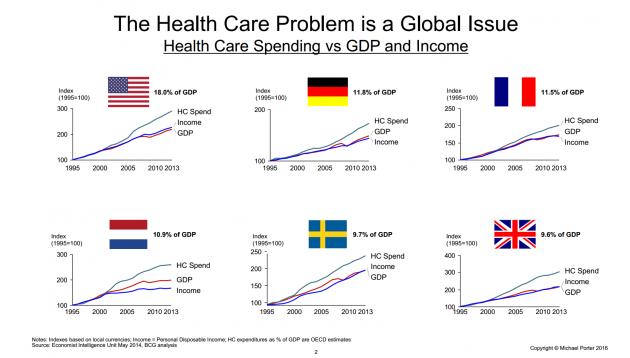The rising cost of health care is a global issue, and Michael Porter aims to solve it with a “value-based healthcare” (VBHC) system that prioritizes maximizing patient value above all.
Experts made these and other points at the 8th annual Healthcare Innovation Seminar 2017 hosted by American Chamber of Commerce in Korea (AMCHAM) in Seoul Friday to discuss how Korea could use big data to make VBHC a reality.
Current medical systems follow a “fee-for-service” payment where patients pay for the services performed. However, the payment often has no correlation to the patient’s overall wellbeing, which is not cost-effective for the patient, Porter argues. For example, a person with diabetes may continually pay for medication, but the payment amounts do not equate to increasing well-being.
The current fee-for-service system, coupled with other issues in healthcare has contributed to increasing healthcare costs all around the world. Korea is also dealing with a rapidly aging population and the rising number of chronic diseases expected to place a burden on the country’s finances. Korea has witnessed one of the most rapid growths in healthcare expenditure per capita in the OECD, and double the average of its member countries over the past decade.

According to Porter, the solution to rising healthcare costs in an aging population is VBHC -- a framework that restructures healthcare systems around the world to achieve maximum patient value. Namely, this system would prioritize bringing maximum patient value over all other factors such as health care access, cost containment, convenience, or customer service.
A Korean expert agreed. “Delivering best outcome at lowest cost is the essence of VBHC,” said Ahn Jeong-hoon안정훈, associate professor of Ewha Womans University Department of Health Convergence.
Medtronic’s Corporate Affairs Director Lee Sang-soo이상수 also presented his analysis on respective countries regarding VBHC progress, finding that Korea ranks “very high” in the category of measuring outcomes and costs while ranking “low” in the outcome-based payment approach category.
Experts are turning to big data to calculate the total cost of each service provided and the total cost of care given to each patient to implement Porter’s “fee-for-value” system. Big data can be the solution for hospitals and other caregivers that are unable to determine these costs accurately and quickly.
Lee said, “For Korea, the goal should to be to implement VBHS with a patient-orientation by utilizing Information Communication Technology (ICT) entirely.” However, the country faces many challenges when it comes to using ICT and specifically big data.
Notably, Korean hospitals still use paper records, making the fractured information system in the country more major problem for using big data. Experts pointed to the need to consolidate information into a single source, requiring collaboration from all sectors of the government, hospitals, doctors, and patients.
An official from the Ministry of Health and Welfare highlighted the current challenges in the Korean market, saying, “Many doctors at individual hospitals are trying to use electronic medical records, but they have the wrong structure. Getting structured data is a challenge for all hospitals at this point. We need more discussion and more investment.”
Notably, he called for an analytical overview from all invested in using big data: “When we discuss big data, we talk about how to employ the right ICT technology and system, but we have to think about what the data is, and what the quality of that data is.”
During the opening session, Minister of Health and Welfare Chung Chin-yeob정진엽 called for strengthening cooperation between Korea and the United States to tackle major health threats. "Strengthening collaboration between Korea and the U.S. is an important task for industrial development," Minister Chung said
Marc Knapper, an official at the U.S. embassy, to Korea, also noted on Korea’s efforts to “become a major player in the global healthcare industry by pushing the biopharmaceutical industry to the forefront. “The United States and Korea will achieve this goal through collaboration,” Knapper said.

